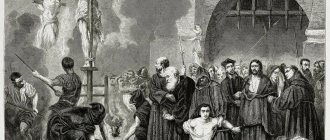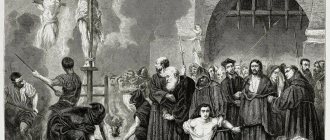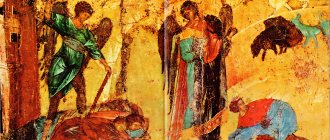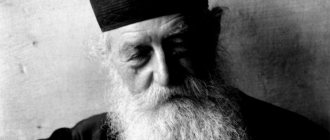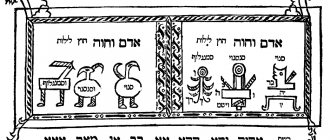| St. Epiphanius, bishop Cypriot. Greek icon |
Epiphanius I of Cyprus, Salamis
(310/332 - 403), Archbishop of Constantia, saint, father and teacher of the Church Commemorated May 12 on the day of burial in Salamis and in the Cathedral of Cyprus Saints (Greek [1])
According to some news, he was born in 310, according to others - in 332, a Phoenician by nationality, who was educated in the house of a rich Jew and therefore first converted to Judaism. In his youth he received a good education. He turned to the Christian faith after the death of his teacher, after he saw a monk named Lucian give his clothes to a beggar. Struck by the monk’s mercy, Epiphanius asked to be instructed in Christianity. He was baptized, distributed his inheritance to the poor, and retired to Egypt.
Returning to Palestine, he became a student of the famous Abba Hilarion. In the monastery, he was engaged in copying Greek books, succeeding in monastic life.
Saint Epiphanius, for his exploits, was awarded the gift of miracles, but in order to avoid human glory, he retired from the monastery to the Spanidrion desert. There he was captured by robbers and held captive for three months. With his word of repentance, the saint led one of the gang of robbers to holy faith in the True God. When the holy ascetic was released, the robber also left with him. Saint Epiphanius brought him to his monastery and baptized him with the name John. From then on, he became a faithful disciple of Saint Epiphanius and carefully recorded the life and miracles of his mentor.
The rumor about the righteous life of Saint Epiphanius spread far beyond the monastery. The saint withdrew into the desert a second time with John. But even in the desert, disciples began to come to him. Thus a new monastery arose. After some time, Saint Epiphanius and John undertook a journey to Jerusalem to venerate its shrines and from there returned to the monastery of Spanidrion.
Residents of the city of Libya sent the monk Polyvius to Saint Epiphanius to convey their request to take the episcopal throne in place of the deceased archpastor. However, the perspicacious ascetic, having learned about this intention, secretly retired to the Paphian desert to the great ascetic Hilarion, under whose guidance he labored in his youth. The saints spent two months in joint prayers, and then Hilarion sent Saint Epiphanius to Salamis (Cyprus). There the bishops gathered to elect a new bishop to replace the one who had recently died. The Lord revealed to the eldest of them, Bishop Pappius of Hitra, that the monk Epiphanius, who had come to the city, should be elected bishop. When Epiphanius was found, Saint Pappius led him into the church, where, in obedience to the will of the participants in the council, Epiphanius had to give his consent. Thus, Saint Epiphanius was elevated to the archbishopric see of Constantius (Salamin) around 367, and he ruled the Church of Cyprus for 36 years.
| St. Epiphanius. Fresco (1318) of the Annunciation Church of the Gracanica Monastery, Kosovo, Serbia |
Saint Epiphanius became famous at the bishop's see for his great zeal for the faith, love and mercy for the poor, and simplicity of character.
One of Epiphanius' main concerns was the founding and strengthening of monasticism in the diocese. He suffered a lot from the slander and envy of some of his clergy. For the purity of his life, Saint Epiphanius received the gift of seeing the influx of the Holy Spirit into the Holy Gifts during the Divine Liturgy. One day the Saint, while performing the Sacrament, was deprived of this vision. Then he called one of the clerics and quietly said to him: “Come out, my son, for today you are not worthy to be present at the celebration of the Sacrament.” At this event, the recordings of his student John were interrupted, as he fell ill and died. A further description of the life of Saint Epiphanius was continued by his second disciple, Poluvius (later Bishop of Rinokir).
At the end of his life, Saint Epiphanius, through the machinations of Empress Eudoxia and Patriarch Theophilos I of Alexandria, was summoned to Constantinople for a council, which was convened for the trial of the great Saint John Chrysostom. But Saint Epiphanius, not wanting to be a participant in the lawless council, left Constantinople. While sailing on the ship, the saint felt the approach of his death, he gave his disciples the last instruction - to keep the commandments of God and keep the mind from unclean thoughts - and died two days later. Residents of the city of Salamis greeted the body of their archpastor with sobs and on May 12, 403 they were buried with honor in the new church built by him.
The VII Ecumenical Council named Saint Epiphanius the father and teacher of the Church.
The views of St. The epiphanies were composed under the influence of the ascetics of Egypt and Palestine, during the most heated struggle of the church with Arianism, in which the Saint himself took an active part.
St. Epiphanius traveled a lot to different countries and lived for a long time in those areas that in the first centuries were the main centers of development of sects; had direct relations with some sects, especially Gnostic ones; Possessing a rare knowledge of languages for that time, mainly Eastern ones, he used collections of anti-heretical and heretical works, and, moreover, those that were later lost. But he did not have a good general philosophical education, did not systematically study theology itself, which is why in his hereseological works there is little criticism of him, much is presented inaccurately and incorrectly; The chronological indications are especially unsatisfactory. Origen, to whom the most famous theologians of the 3rd and centuries. treated with special respect, widely using his works and ideas, St. Epiphanius considered him the source of all kinds of heresies.
Essays
| St. Epiphanius, bishop Cypriot. Fresco (1547, by Zorzis Fuka) in the Dionysiates Monastery, Athos |
Two of his works are devoted to the denunciation of heresies: “Ankorat” (ανκύρωτος, anchor), where the Orthodox teaching about the Trinity, the Incarnation, the resurrection of the dead and the future life is revealed, mainly against the Arians, Semi-Arians, Doukhobors and Apollinarians;
and “Panarius” (πανάριον - pharmacy, box with medicines), in which 20 pre-Christian and 80 Christian heresies are described and refuted. A significant part of the work of Archpriest is devoted to a detailed presentation of these works and their evaluation. A. M. Ivantsova-Platonova: “Heresies and schisms of the first centuries of Christianity” [2].
With all their shortcomings, both works of Epiphanius provide abundant material for the history of the development of Christian ideas and especially heretical ideas, containing, at the same time, a lot of information from other areas of history.
Other works of Epiphanius:
- “The Book of Weights and Measures” (biblical), important for the history of metrology; here is information about Greek translations of the Bible;
- “Physiologist” - observations on the properties of biblical animals (in this work Epiphanius contains only notes);
- “On the Stones” - an explanation of the 12 stones that were on the breastplate of the Jewish high priest;
- “On the 22 prophets of the Old Testament and three New Testaments and on the 12 apostles and 70 disciples of Christ” is an essay valuable according to oral church historical traditions;
- 12 sermons whose authenticity is disputed.
Editions of his works:
- D. Petavius (Greek text and Latin translation, with notes and with his ancient biography) - “S. Epiphanii opera" (Paris, 1622 and Cologne, 1682). This edition has been reprinted -
- Minem, in “Patrolog. cursus compl. ser. graeca" (vols. XLI-XLIII).
- Dindorf'a - Leipzig, 1860;
- Oeler - Greek text of hereseological works, Berlin 1859-1869.
Published in Russian:
- Creations. Parts 1-4. M., 1880-1881. Parts 5-6. M., 1882-1886. (“Creations of the Holy Fathers in Russian translation.” ed. at the MDA. vols. 42, 44, 46, 48, 49).
- Word on the Ascension of our Lord Jesus Christ. - “Christian Reading”, 1829, p. 121 ref.
- Word of the week Vaiy. - Right there. 1838, I, p. 258 pp.; 1841, I, p. 345 pp.
- Word on the Holy Resurrection of Christ. - Ibid., 1838, II, p. 21 pp. Also: “Additions to the Church Gazette”, 1900, Nos. 15-16.
- The Word Against the Sabellians - Christian Reading, 1840, II, p. 281 pp.
- Statement of the Catholic Faith. From the 3rd book against heresies. - Ibid., 1842, I, p. 303 pp.
- Word for Holy Saturday. — Ibid., 1846, II. With. 27 pp.
- Panarium or home pharmacy. Per. MDA. M., 1863, 1864, 1872.
| Saint Epiphanius, Bishop of Cyprus |
Epiphanius, Archbishop of Cyprus
Epiphanius, Archbishop of Cyprus
1. Saint Epiphanius, Archbishop of Cyprus, was a native of Phenicia, a Jew by birth and faith. As a child, he lost his parents, first his father, then his mother, adopted Christianity together with his sister Callitropia and entered the monastery when he was sixteen years old. Callitropia also became the bride of Christ in the guise of nuns257. 2. The brotherhood of the monastery in which Saint Epiphanius became a monk consisted of ten monks. The Monk Lucian, a spirit-bearing man, presided over them; Also among the brethren there were men filled with the grace of God. In the company of such brotherhood, under such leadership, the chosen vessel, Epiphanius, soon achieved spiritual prosperity, which subsequently developed in him in extraordinary abundance. The brethren were engaged in copying sacred books: with this handicraft they supported themselves and the monastery258. This handicraft also had its spiritual purpose: this is clear from the writings and many sayings of Saint Epiphanius
.
3. He said: “Ignorance of the Scriptures is a great rapids and a deep abyss.”259 4. He said: “Ignorance of Divine laws is a great betrayal of one’s salvation”260. 5. He said: “Reading Scripture is a great defense against sin.”261 6. He said: “The acquisition of Christian books for those who have the means for such acquisition is necessary; Just the sight of these books stops the desire for sin in us and arouses in us the desire for virtue.”262 This is how concepts and sensations were expressed that were born from private practice, which was carried out in the spiritual mind and with a primarily spiritual purpose
.
7. Epiphanius, Bishop of Cyprus, of blessed memory, was informed by the abbot of his monastery in Palestine: “We do not abandon your rule and carefully conduct divine services at the third, sixth, ninth hour and in the evening.” He responded by ordering him to say: “It follows from this that at other times you remain without prayer; but a true monk must constantly pray and sing in his heart.”263 St. Epiphanius, before his elevation to the rank of bishop, founded a monastery in Palestine and was its abbot.
Despite the fact that the monastery was located in the deep desert, many visitors flocked to it from everywhere. They were attracted by the abundant gift of miracles and other spiritual gifts with which God was pleased to adorn His saint. This forced Epiphanius to often leave his monastery for a long time. During one of these journeys, he was carried by a storm to Salamon or Constantia, a city on the island of Cyprus. There, at that time, a council of bishops was engaged in the election of a bishop for the city, and, by revelation from Above, consecrated Epiphanius as Archbishop of Constantia and the entire Cyprus Island .
8. One day Epiphanius, Archbishop of Cyprus, sent to Abba Hilarion, begging him to come to him. “Come for a meeting with me before we leave the body,” the saint said in his invitation. Abba Hilarion came, and the elders rejoiced mutually over each other. As they sat at the meal, poultry was served. The bishop took part of it and gave it to Abba Hilarion. But the elder said to him: “Forgive me, Father: from the time I took on the monastic form, I have not put anything slain into my mouth.” The bishop answered: “And from the time I took on the monastic form, I did not allow anyone to fall asleep, having anger against me.” Abba Hilarion said to this: “Forgive me, Father! your residence is higher than mine”264. 9. When Epiphanius had already reached a ripe old age, he was called to Constantinople to participate in the council of bishops on the case of St. John Chrysostom. Seeing that the council was acting out of passion, he personally asked Emperor Arcadius for permission to return to Cyprus. During this meeting, the emperor asked Epiphanius: how old is he? Epiphanius answered: “One hundred and fifteen years and three months. I was ordained bishop when I was sixty years old; I have been in the rank of bishop for fifty-five years and three months.” On the same day, says the writer of Epifaniev’s life, we boarded a ship sailing to Cyprus. Epiphanius fit into the lower part of the ship, and we with him. Epiphanius had the custom of constantly holding the Gospel in his hands. He sighed and wept three times, opening the Gospel; closing it, he shed tears again. Then he stood up and prayed; After completing the prayer, he sat down again in the same place, in the lower part of the ship, and with tears began to tell us: “If you, my children, love me, then keep my commandments, and the love of God will abide in you. You know how many sorrows I went through in this life - and I did not consider these sorrows to be sorrows, but always remained cheerful, trusting in God; God did not leave me, but always preserved me from all the snares of the evil one. “All things work together for good to those who love God” (Rom. 8:28
).
One day, my beloved children, when I was in a deserted place and offered a prayer to Christ that He would free me from all the slander of the enemy, many demons attacked me. They began to torment me and, grabbing me by the legs, dragged me along the ground. Some of them hurt me. They did this to me for ten days. After that, I no longer saw the demon in his own face all the days of my life, but he poured out his anger on me through the mediation of people: such misadventures befell me in Phenicia from the frantic Simonians, in Egypt from the wicked Gnostics, in Cyprus from the wicked Valentinians and from other heretics. Listen carefully, O my children, to the words of Epiphanius the sinner. Do not lust after money, and money will be sent to you in abundance. Do not hate any man, and God will love you. Do not slander your brethren, and the devil will not dominate you by stirring up your passions. Turn away from all heresies, as from beasts filled with deadly poison; I have conveyed this to you in books called Panaria. Turn away and be kept from the lusts of the world, which corrupt both mind and body. Know that through these lusts Satan approaches you. Sometimes peace in the flesh is not disturbed, but the spirit of those who are not sober is subject to desecration by dreams. When our mind is awake and constantly remains in the remembrance of God, then we conveniently defeat the enemy.”265 This was the dying instruction of Saint Epiphanius to his disciples: he died on the ship and did not reach Cyprus. 257Sancti Epiphanii vita, Patr. Gr. Tom. 416 cap. 1, VIII and IX. 258Sancti Epiphanii vita, Patr. Gr. Tom. 416 cap. 1, VIII and IX. 259Alphabetical Patericon and Memorable Tales. 260Alphabetical Patericon and Memorable Tales. 261Alphabetical Patericon and Memorable Tales. 262Alphabetical Patericon and Memorable Tales. 263Patrol. pag. 941. 264 Memorable Tales. 265Vita, cap. LXIII and LXIV. Views: 147
Prayers
Troparion of St. Epiphany of Cyprus and Herman of Constantinople, Greek, tone 1
The duo of servants of the beginningless Divinity, / God-like dogmas of the all-wise manifestations, / with Epiphanius we sing to the divine, / like the luminaries of the ineffable mysteries, / light guides calling: / Glory of the crown to him who magnified you,/ glory to him who affirmed the Orthodox faith by you.
Kontakion of St. Epiphany of Cyprus and Herman of Constantinople, tone 4
(Similar to: Ascended:)
Let us praise the wondrous duo, faithfully, according to duty, / with Herman of the Divine Epiphanius: / these have fallen to the godless tongues, / the most wise dogmas have been entrusted to all, / / those who sing Orthodoxy at True to piety, it is a great sacrament.
Kontakion, Greek, tone 8
As the Trinity, God-speaking teachers/ and heavenly talents is a colonic source,/ Let us praise Herman and Epiphanius./ Taught by the divine lights,/ we have understood the mystery of piety, and to them we cry // joy Hey, God-wise union.
Orthodox Life
There lived in the 4th century an intolerant saint, for whom the question of Truth was fundamentally important and not subject to any concessions.
We are talking about St. Epiphany of Cyprus, whose memory the Orthodox Church celebrates on May 25.
I will not dwell on his biography, since to briefly familiarize yourself with it you need to spend about ten minutes, and the text itself is easy to find on the Internet. We are now halfway between Easter and Ascension, followed by Pentecost and other holidays of the annual cycle. But not every Orthodox Christian is able to clearly determine what exactly these or other events of the Gospel history, singled out by the Church for special veneration, give me? We will not answer this question in detail, since we are talking, first of all, about St. Epiphany, however, it is in his writings that one can find a living, genuine experience of the redemptive feat of Christ. His reasoning is not of an abstract nature; the saint really sees that the Lord came to save him, and this is expressed in the appropriate style of constructing the text: “When I was weak in the flesh, the Savior was sent to me in the likeness of sinful flesh (Rom. 8:3), fulfilling such a dispensation to redeem me from slavery, corruption and death. He became my justification and sanctification and redemption (1 Cor. 1:30): justification because He took away sin by His faith, sanctification because He set me free by water and the Spirit and His word, redemption because He gave Himself and His true lamb Blood as an atonement for me; He became the propitiation (Rom. 3:25) for the purification of the world, for the reconciliation of all things in heaven and on earth (Col. 1:20), fulfilling at a certain time the mystery that was hidden before the ages and generations (Col. 1:26).”
In the 4th century, as today, many heretics belittled either the human or divine nature in Christ. For St. This was unacceptable for Epiphanius, since salvation itself made it impossible. If the Lord did not accept the whole person, it means that some part of him remained the food of the devil, which, in fact, closes the path to the Kingdom of Heaven for us. I repeat that this living sense of Truth is exactly what St. Epiphany is worth learning for each of us. Yes, when praying at the festive Liturgy, we feel joy, some kind of inner uplift, but we are also influenced by the atmosphere of the holiday itself, and the smiling people around, and even the invigorating holy water that gets on our face (if something is blessed on this day ). But let’s honestly answer ourselves: where in all this joy is there room for the clear realization that by one action or another Christ is saving me, that it is for me that the prospect of eternal bliss is opening up? For St. Epiphanius there could not be many different paths to the One God, as today’s so-called unchurched Christians like to speculate. The path to salvation is one, narrow and thorny path, and every event of Christ’s Redemptive feat makes it complete and possible to overcome. “For our sake he became a man from Mary without the seed of a husband,” St. writes about the Savior. Epiphanius, taking the mixture from humanity, brings to the Father the priesthood, which has no succession, in order to become a Priest for us according to the order of Melchizedek. For He remains forever offering gifts for us, having first offered Himself on the cross, to abolish every sacrifice of the Old Testament, making a most perfect and living sacrifice, Himself the Sacrifice, Himself the Sacrifice, Himself the Priest, Himself the Altar, Himself God, Himself - a man, Himself a King, Himself a High Priest, Himself a Sheep, Himself a Lamb, for our sake becoming all in all, in order to become Life for us.” It’s difficult to add anything to these words, but try to look closely at them, experience them and feel literally on some inner, heartfelt level how much Christ did for all of us and for each of us individually!
During the time of St. Epiphanius there were quite a lot of heretics who either rejected the general resurrection or taught about it incorrectly. We continue to celebrate Easter, so let’s dwell on this topic in a little more detail, because the saint considered the Resurrection of Christ to be the main proof of the possibility of our resurrection. He emphasized the justice and justice of God, who will resurrect the very bodies in which we lived on earth. Why is this position known to us so important? The fact is that St. Epiphanius polemicized with the Origenists, who taught that the Lord gives people other, more spiritual bodies. Thus, it turns out that together with the soul it will not be its body that will be judged, that is, not the body that was in vigils, fasting and other struggles, but some other body that is unfair. The example of Enoch and Elijah, according to the saint, clearly indicates that each will have his body returned. For the saved, although the newly acquired body will be identical to the lost one, it will acquire new qualities, such as: spirituality, glory, radiance, incorruptibility, immortality, dispassion, subtlety and the ability to penetrate through other bodies. The general resurrection will be a personal act of God, just as He acted during the creation of the world, and will be accomplished in an instant.
This is only a small fraction of those affected by St. Epiphanius of Cyprus themes, but, as we understand, for him they were not abstract philosophizing, but life itself, directed into eternity. I would like for every Orthodox Christian not only to become acquainted with the patristic thought, but also to experience it in the same way as the saints themselves experienced it.
Archpriest Vladimir Dolgikh
Used materials
- Encyclopedic Dictionary of Brockhaus and Efron.
- Menea. May, part 2, ed. Moscow Patriarchate, p. 12:
- (kontakion)
- (Greek troparion and kontakion)
[1] “Επιφάνιος ο Μέγας (επίσκοπος Κωνσταντίας, εορτάζεται στις 12 Μαΐου)” alphabet a complete list of Cypriot saints on the official website of the Constance-Amochos Metropolis of the Cypriot Orthodox Church,
[2] part I - review of sources for the history of ancient sects, M., 1877
Historical messages of the reverend
Not all theologians agree with the authorship of Epiphanius regarding such messages as the doctrine of Strigolniki, the life of Tsar Dmitry, but everyone is unequivocally sure that the famous monk was written by:
- Message to friend Kirill;
- Life of Saint Stephen, Bishop of Perm;
- Life of Saint Sergius of Radonezh;
- The tale of Epiphanius Mnich about the path to the holy city of Jerusalem.
Works of Saint Epiphanius
The hagiographer dedicated his first message to his friend and mentor Stefan of Perm. The Life of St. Stephen gives an idea not only of St. Stephen, the atmosphere and morals of that time, but also of the author of the letter himself.
Word of praise to St. Sergius of Radonezh
In this work, the hagiographer praises his teacher and mentor, emphasizing that the monk had the gift of miracles and healing. By the grace of God, as a reward for a righteous life, Sergius of Radonezh was honored to serve believers, granting them salvation and healing through prayers at the shrine with incorruptible relics.
Epiphany at work
This Word was supposedly written in 1412 in honor of the consecration of the Church of the Holy Trinity after its restoration. It is clear from the letter that its author traveled a lot, visited Constantinople, Athos and Jerusalem.
Epiphanius the Wise composed a troparion to St. Sergius of Radonezh.

